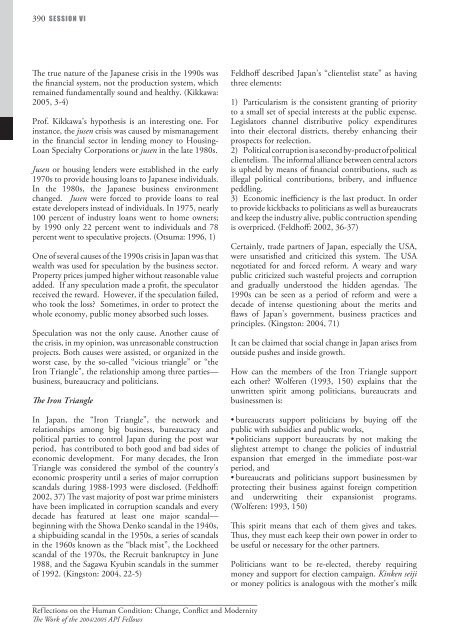Reflections on the Human Condition - Api-fellowships.org
Reflections on the Human Condition - Api-fellowships.org
Reflections on the Human Condition - Api-fellowships.org
You also want an ePaper? Increase the reach of your titles
YUMPU automatically turns print PDFs into web optimized ePapers that Google loves.
390 SESSION VI<br />
The true nature of <strong>the</strong> Japanese crisis in <strong>the</strong> 1990s was<br />
<strong>the</strong> financial system, not <strong>the</strong> producti<strong>on</strong> system, which<br />
remained fundamentally sound and healthy. (Kikkawa:<br />
2005, 3-4)<br />
Prof. Kikkawa’s hypo<strong>the</strong>sis is an interesting <strong>on</strong>e. For<br />
instance, <strong>the</strong> jusen crisis was caused by mismanagement<br />
in <strong>the</strong> financial sector in lending m<strong>on</strong>ey to Housing-<br />
Loan Specialty Corporati<strong>on</strong>s or jusen in <strong>the</strong> late 1980s.<br />
Jusen or housing lenders were established in <strong>the</strong> early<br />
1970s to provide housing loans to Japanese individuals.<br />
In <strong>the</strong> 1980s, <strong>the</strong> Japanese business envir<strong>on</strong>ment<br />
changed. Jusen were forced to provide loans to real<br />
estate developers instead of individuals. In 1975, nearly<br />
100 percent of industry loans went to home owners;<br />
by 1990 <strong>on</strong>ly 22 percent went to individuals and 78<br />
percent went to speculative projects. (Otsuma: 1996, 1)<br />
One of several causes of <strong>the</strong> 1990s crisis in Japan was that<br />
wealth was used for speculati<strong>on</strong> by <strong>the</strong> business sector.<br />
Property prices jumped higher without reas<strong>on</strong>able value<br />
added. If any speculati<strong>on</strong> made a profit, <strong>the</strong> speculator<br />
received <strong>the</strong> reward. However, if <strong>the</strong> speculati<strong>on</strong> failed,<br />
who took <strong>the</strong> loss? Sometimes, in order to protect <strong>the</strong><br />
whole ec<strong>on</strong>omy, public m<strong>on</strong>ey absorbed such losses.<br />
Speculati<strong>on</strong> was not <strong>the</strong> <strong>on</strong>ly cause. Ano<strong>the</strong>r cause of<br />
<strong>the</strong> crisis, in my opini<strong>on</strong>, was unreas<strong>on</strong>able c<strong>on</strong>structi<strong>on</strong><br />
projects. Both causes were assisted, or <strong>org</strong>anized in <strong>the</strong><br />
worst case, by <strong>the</strong> so-called “vicious triangle” or “<strong>the</strong><br />
Ir<strong>on</strong> Triangle”, <strong>the</strong> relati<strong>on</strong>ship am<strong>on</strong>g three parties—<br />
business, bureaucracy and politicians.<br />
The Ir<strong>on</strong> Triangle<br />
In Japan, <strong>the</strong> “Ir<strong>on</strong> Triangle”, <strong>the</strong> network and<br />
relati<strong>on</strong>ships am<strong>on</strong>g big business, bureaucracy and<br />
political parties to c<strong>on</strong>trol Japan during <strong>the</strong> post war<br />
period, has c<strong>on</strong>tributed to both good and bad sides of<br />
ec<strong>on</strong>omic development. For many decades, <strong>the</strong> Ir<strong>on</strong><br />
Triangle was c<strong>on</strong>sidered <strong>the</strong> symbol of <strong>the</strong> country’s<br />
ec<strong>on</strong>omic prosperity until a series of major corrupti<strong>on</strong><br />
scandals during 1988-1993 were disclosed. (Feldhoff:<br />
2002, 37) The vast majority of post war prime ministers<br />
have been implicated in corrupti<strong>on</strong> scandals and every<br />
decade has featured at least <strong>on</strong>e major scandal—<br />
beginning with <strong>the</strong> Showa Denko scandal in <strong>the</strong> 1940s,<br />
a shipbuiding scandal in <strong>the</strong> 1950s, a series of scandals<br />
in <strong>the</strong> 1960s known as <strong>the</strong> “black mist”, <strong>the</strong> Lockheed<br />
scandal of <strong>the</strong> 1970s, <strong>the</strong> Recruit bankruptcy in June<br />
1988, and <strong>the</strong> Sagawa Kyubin scandals in <strong>the</strong> summer<br />
of 1992. (Kingst<strong>on</strong>: 2004, 22-5)<br />
Ref lecti<strong>on</strong>s <strong>on</strong> <strong>the</strong> <strong>Human</strong> C<strong>on</strong>diti<strong>on</strong>: Change, C<strong>on</strong>flict and Modernity<br />
The Work of <strong>the</strong> 2004/2005 API Fellows<br />
Feldhoff described Japan’s “clientelist state” as having<br />
three elements:<br />
1) Particularism is <strong>the</strong> c<strong>on</strong>sistent granting of priority<br />
to a small set of special interests at <strong>the</strong> public expense.<br />
Legislators channel distributive policy expenditures<br />
into <strong>the</strong>ir electoral districts, <strong>the</strong>reby enhancing <strong>the</strong>ir<br />
prospects for reelecti<strong>on</strong>.<br />
2) Political corrupti<strong>on</strong> is a sec<strong>on</strong>d by-product of political<br />
clientelism. The informal alliance between central actors<br />
is upheld by means of financial c<strong>on</strong>tributi<strong>on</strong>s, such as<br />
illegal political c<strong>on</strong>tributi<strong>on</strong>s, bribery, and influence<br />
peddling.<br />
3) Ec<strong>on</strong>omic inefficiency is <strong>the</strong> last product. In order<br />
to provide kickbacks to politicians as well as bureaucrats<br />
and keep <strong>the</strong> industry alive, public c<strong>on</strong>tructi<strong>on</strong> spending<br />
is overpriced. (Feldhoff: 2002, 36-37)<br />
Certainly, trade partners of Japan, especially <strong>the</strong> USA,<br />
were unsatisfied and criticized this system. The USA<br />
negotiated for and forced reform. A weary and wary<br />
public criticized such wasteful projects and corrupti<strong>on</strong><br />
and gradually understood <strong>the</strong> hidden agendas. The<br />
1990s can be seen as a period of reform and were a<br />
decade of intense questi<strong>on</strong>ing about <strong>the</strong> merits and<br />
flaws of Japan’s government, business practices and<br />
principles. (Kingst<strong>on</strong>: 2004, 71)<br />
It can be claimed that social change in Japan arises from<br />
outside pushes and inside growth.<br />
How can <strong>the</strong> members of <strong>the</strong> Ir<strong>on</strong> Triangle support<br />
each o<strong>the</strong>r? Wolferen (1993, 150) explains that <strong>the</strong><br />
unwritten spirit am<strong>on</strong>g politicians, bureaucrats and<br />
businessmen is:<br />
• bureaucrats support politicians by buying off <strong>the</strong><br />
public with subsidies and public works,<br />
• politicians support bureaucrats by not making <strong>the</strong><br />
slightest attempt to change <strong>the</strong> policies of industrial<br />
expansi<strong>on</strong> that emerged in <strong>the</strong> immediate post-war<br />
period, and<br />
• bureaucrats and politicians support businessmen by<br />
protecting <strong>the</strong>ir business against foreign competiti<strong>on</strong><br />
and underwriting <strong>the</strong>ir expansi<strong>on</strong>ist programs.<br />
(Wolferen: 1993, 150)<br />
This spirit means that each of <strong>the</strong>m gives and takes.<br />
Thus, <strong>the</strong>y must each keep <strong>the</strong>ir own power in order to<br />
be useful or necessary for <strong>the</strong> o<strong>the</strong>r partners.<br />
Politicians want to be re-elected, <strong>the</strong>reby requiring<br />
m<strong>on</strong>ey and support for electi<strong>on</strong> campaign. Kinken seiji<br />
or m<strong>on</strong>ey politics is analogous with <strong>the</strong> mo<strong>the</strong>r’s milk

















